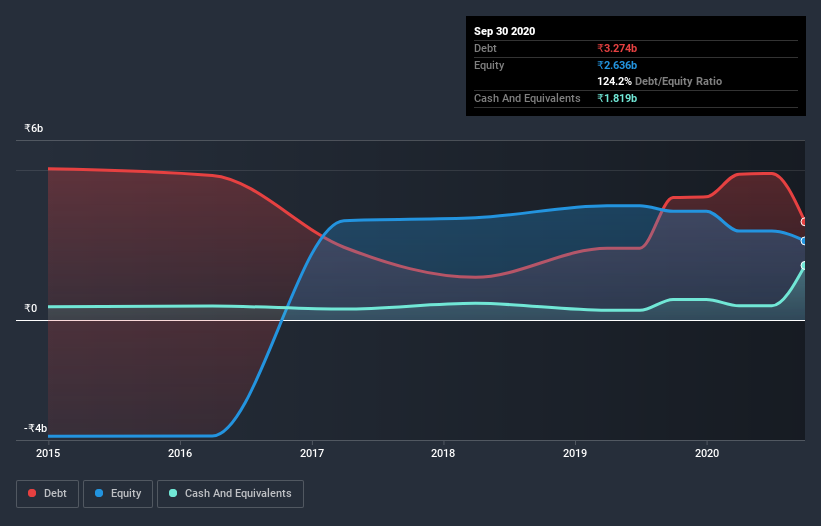Does Mawana Sugars (NSE:MAWANASUG) Have A Healthy Balance Sheet?

Legendary fund manager Li Lu (who Charlie Munger backed) once said, 'The biggest investment risk is not the volatility of prices, but whether you will suffer a permanent loss of capital.' So it seems the smart money knows that debt - which is usually involved in bankruptcies - is a very important factor, when you assess how risky a company is. Importantly, Mawana Sugars Limited (NSE:MAWANASUG) does carry debt. But the real question is whether this debt is making the company risky.
What Risk Does Debt Bring?
Debt is a tool to help businesses grow, but if a business is incapable of paying off its lenders, then it exists at their mercy. In the worst case scenario, a company can go bankrupt if it cannot pay its creditors. While that is not too common, we often do see indebted companies permanently diluting shareholders because lenders force them to raise capital at a distressed price. Of course, the upside of debt is that it often represents cheap capital, especially when it replaces dilution in a company with the ability to reinvest at high rates of return. When we examine debt levels, we first consider both cash and debt levels, together.
Check out our latest analysis for Mawana Sugars
What Is Mawana Sugars's Debt?
As you can see below, Mawana Sugars had ₹3.27b of debt at September 2020, down from ₹4.08b a year prior. On the flip side, it has ₹1.82b in cash leading to net debt of about ₹1.46b.

How Strong Is Mawana Sugars's Balance Sheet?
We can see from the most recent balance sheet that Mawana Sugars had liabilities of ₹6.54b falling due within a year, and liabilities of ₹1.80b due beyond that. On the other hand, it had cash of ₹1.82b and ₹471.2m worth of receivables due within a year. So its liabilities total ₹6.06b more than the combination of its cash and short-term receivables.
The deficiency here weighs heavily on the ₹903.6m company itself, as if a child were struggling under the weight of an enormous back-pack full of books, his sports gear, and a trumpet. So we'd watch its balance sheet closely, without a doubt. At the end of the day, Mawana Sugars would probably need a major re-capitalization if its creditors were to demand repayment. The balance sheet is clearly the area to focus on when you are analysing debt. But you can't view debt in total isolation; since Mawana Sugars will need earnings to service that debt. So if you're keen to discover more about its earnings, it might be worth checking out this graph of its long term earnings trend.
In the last year Mawana Sugars wasn't profitable at an EBIT level, but managed to grow its revenue by 49%, to ₹17b. Shareholders probably have their fingers crossed that it can grow its way to profits.
Caveat Emptor
Even though Mawana Sugars managed to grow its top line quite deftly, the cold hard truth is that it is losing money on the EBIT line. Indeed, it lost ₹42m at the EBIT level. Reflecting on this and the significant total liabilities, it's hard to know what to say about the stock because of our intense dis-affinity for it. Sure, the company might have a nice story about how they are going on to a brighter future. But the reality is that it is low on liquid assets relative to liabilities, and it lost ₹971m in the last year. So we're not very excited about owning this stock. Its too risky for us. When analysing debt levels, the balance sheet is the obvious place to start. But ultimately, every company can contain risks that exist outside of the balance sheet. To that end, you should learn about the 4 warning signs we've spotted with Mawana Sugars (including 1 which is doesn't sit too well with us) .
If, after all that, you're more interested in a fast growing company with a rock-solid balance sheet, then check out our list of net cash growth stocks without delay.
If you’re looking to trade Mawana Sugars, open an account with the lowest-cost* platform trusted by professionals, Interactive Brokers. Their clients from over 200 countries and territories trade stocks, options, futures, forex, bonds and funds worldwide from a single integrated account. Promoted
New: Manage All Your Stock Portfolios in One Place
We've created the ultimate portfolio companion for stock investors, and it's free.
• Connect an unlimited number of Portfolios and see your total in one currency
• Be alerted to new Warning Signs or Risks via email or mobile
• Track the Fair Value of your stocks
This article by Simply Wall St is general in nature. It does not constitute a recommendation to buy or sell any stock, and does not take account of your objectives, or your financial situation. We aim to bring you long-term focused analysis driven by fundamental data. Note that our analysis may not factor in the latest price-sensitive company announcements or qualitative material. Simply Wall St has no position in any stocks mentioned.
*Interactive Brokers Rated Lowest Cost Broker by StockBrokers.com Annual Online Review 2020
Have feedback on this article? Concerned about the content? Get in touch with us directly. Alternatively, email editorial-team@simplywallst.com.
About NSEI:MAWANASUG
Mawana Sugars
Manufactures and sells sugar products in India and internationally.
Solid track record, good value and pays a dividend.
Market Insights
Community Narratives




